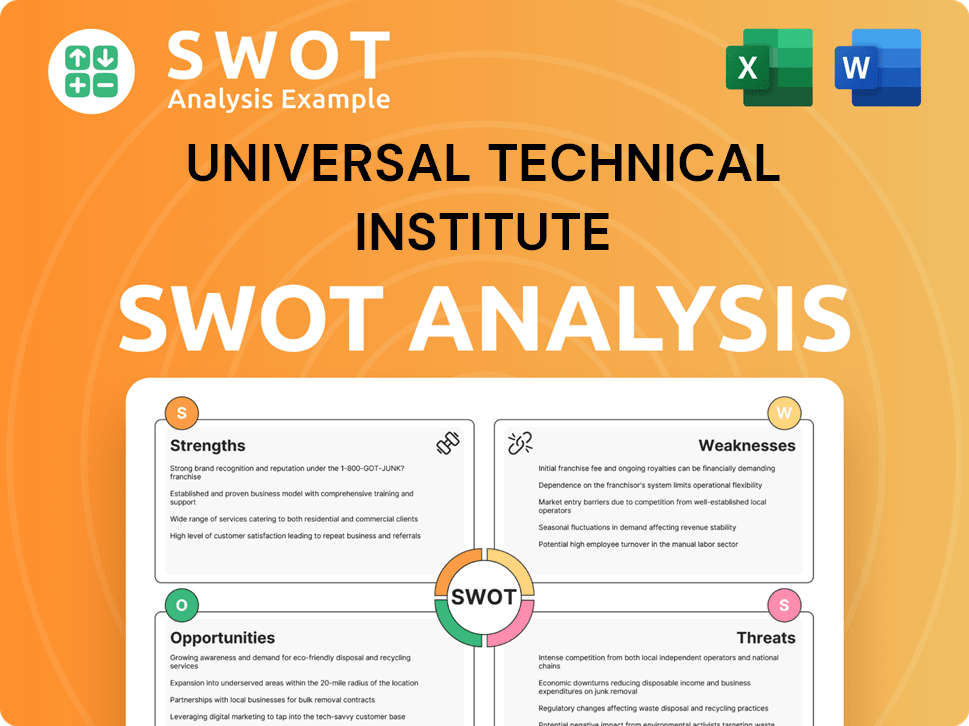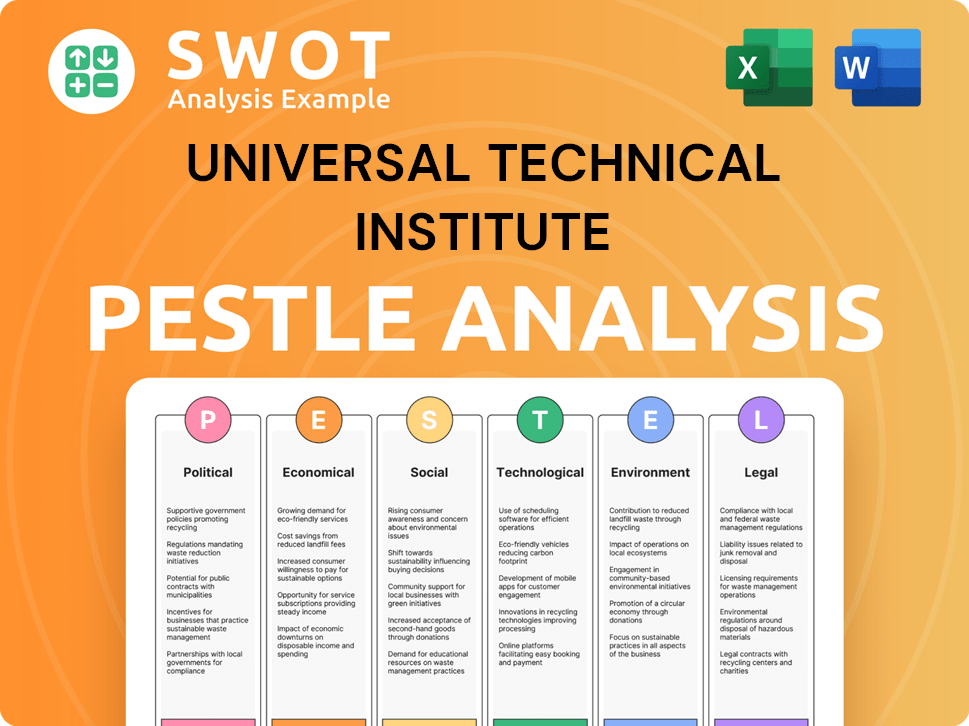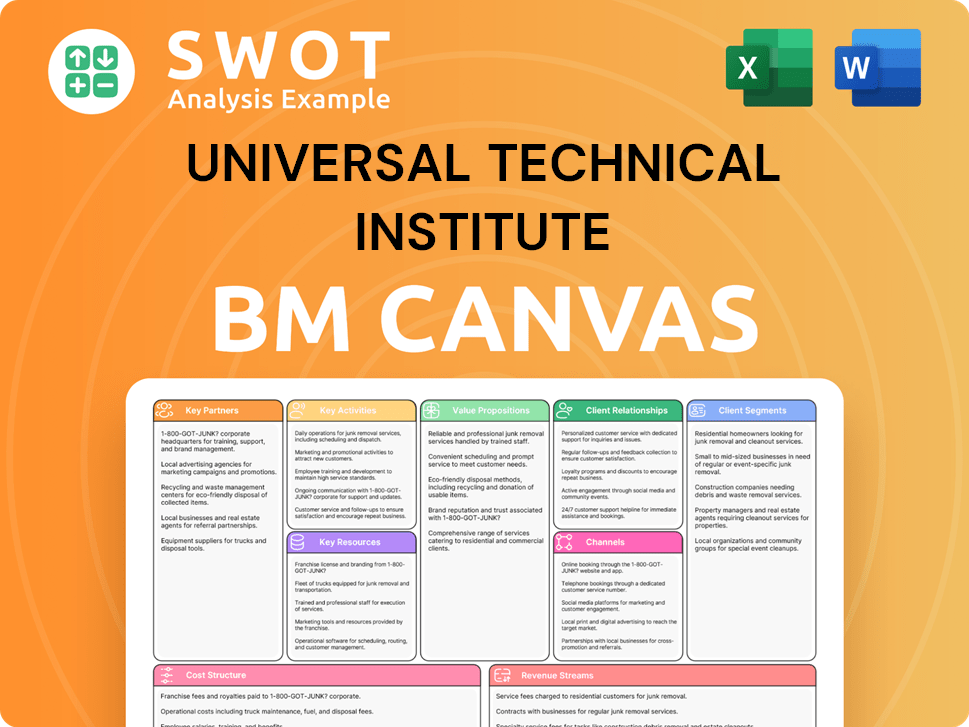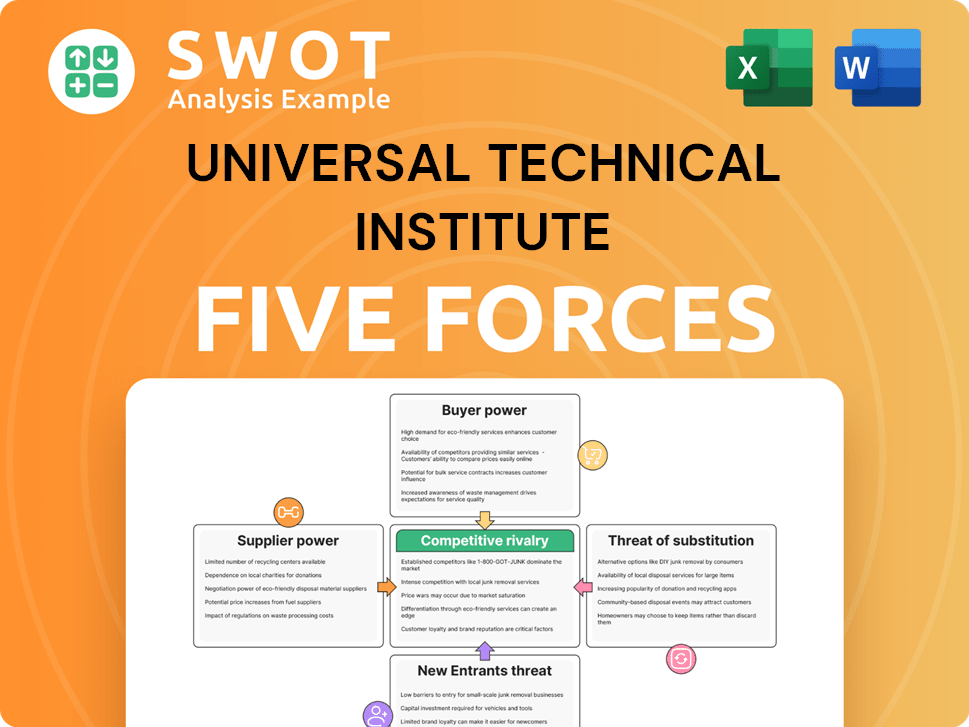Universal Technical Institute Bundle
Who Really Controls Universal Technical Institute?
The ownership structure of a company is a crucial determinant of its strategic direction and future prospects. Understanding who owns Universal Technical Institute SWOT Analysis reveals the driving forces behind this leading technical school. Founded in 1965, UTI has evolved from a single automotive repair training school into a national network of campuses offering diverse technical programs.

From its humble beginnings, Universal Technical Institute has grown significantly, but who are the key players shaping its destiny today? This exploration into UTI ownership will examine the evolution of its investor base, from its founders and early backers to its current major stakeholders. Analyzing the UTI ownership structure provides valuable insights into the company's financial health, leadership, and long-term strategy, answering questions like "Who is the CEO of Universal Technical Institute?" and "Is Universal Technical Institute a public company?"
Who Founded Universal Technical Institute?
The story of Universal Technical Institute (UTI) begins in 1965, marking the inception of a significant player in technical education. Founded by Robert I. Sweet in Phoenix, Arizona, the institution started with a modest class of just 11 students. This initial focus on automotive repair training set the stage for UTI's future growth and expansion.
Robert I. Sweet, a graduate of the State University of New York at Oswego, brought a vision to the company that emphasized quality training. His background in Vocational Education shaped the company's early philosophy, focusing on providing professional development for those inclined toward mechanical fields. This commitment laid the groundwork for UTI's evolution into a leading technical school.
Over the years, UTI expanded its curriculum. In 1968, diesel programs were introduced, followed by air conditioning and heating repair training in 1969. While specific details about the initial equity distribution are not widely available in public records, a major event occurred in January 1998. This event reshaped the UTI ownership landscape.
In January 1998, UTI acquired Clinton Harley Corporation and Clinton Education Group, Inc. for $26.3 million. This acquisition included the Motorcycle Mechanics Institute (MMI), founded by John C. White in 1973. This merger significantly impacted the company's leadership and potentially its UTI ownership structure.
- John C. White, previously the president of Clinton/MMI, became the chief strategic planning officer and board chairman of UTI.
- This shift in leadership marked a pivotal moment in the company's history.
- The acquisition of MMI broadened UTI's educational offerings.
- The early focus on automotive repair expanded to include diesel and HVAC programs.
The acquisition of Clinton Harley Corporation and Clinton Education Group, Inc. for $26.3 million in January 1998 was a key moment. John C. White, who was then president of Clinton/MMI, took on the roles of chief strategic planning officer and board chairman at UTI. This transition highlighted a significant shift in leadership and potentially influenced the Who owns UTI structure. For more insights into the company's strategic direction, consider exploring the Growth Strategy of Universal Technical Institute.
Universal Technical Institute SWOT Analysis
- Complete SWOT Breakdown
- Fully Customizable
- Editable in Excel & Word
- Professional Formatting
- Investor-Ready Format

How Has Universal Technical Institute’s Ownership Changed Over Time?
The evolution of Universal Technical Institute (UTI)'s ownership has been marked by significant shifts since its initial public offering (IPO) in 2003. The company's transition to a publicly traded entity opened the door for institutional investors to acquire substantial stakes. As of June 11, 2025, UTI's market capitalization is approximately $1.78 billion, reflecting its standing in the education sector.
A pivotal event in UTI's ownership history was the private placement of convertible preferred stock by Coliseum Capital Management, LLC, in June 2016. This investment, which raised $70 million, not only injected capital for growth but also granted Coliseum a seat on the board of directors. This strategic move underscores how major investments can reshape the company's direction and influence its corporate structure.
| Shareholder | Shares Held (as of March 31, 2025) | Change from Previous Period |
|---|---|---|
| Coliseum Capital Management, LLC | 5,145,755 | -24.886% |
| BlackRock, Inc. | 3,516,102 | +9.774% |
| Vanguard Group Inc | 3,052,652 | +11.181% |
As of May 2025, institutional investors held between 70.00% and 92.49% of UTI's stock, highlighting their dominant role. Insiders maintained a smaller, but still significant, ownership ranging from 4.54% to 8.66%. This ownership structure indicates that the company's strategic decisions and stock performance are heavily influenced by these institutional investors. Knowing who owns UTI provides valuable insights into the company's financial health and future prospects. For more details, you can explore the [Universal Technical Institute company profile].
UTI's ownership is primarily institutional, influencing strategic decisions. Major shareholders include Coliseum Capital Management, BlackRock, and Vanguard. A 2016 investment by Coliseum Capital significantly impacted the company's direction.
- Institutional investors hold a significant portion of UTI shares.
- Coliseum Capital's investment in 2016 was a pivotal moment.
- Understanding the ownership structure is crucial for investors.
- UTI is a for-profit school.
Universal Technical Institute PESTLE Analysis
- Covers All 6 PESTLE Categories
- No Research Needed – Save Hours of Work
- Built by Experts, Trusted by Consultants
- Instant Download, Ready to Use
- 100% Editable, Fully Customizable

Who Sits on Universal Technical Institute’s Board?
The Board of Directors of Universal Technical Institute (UTI) oversees the company's strategic direction and corporate governance. While specific details on the current board members and their affiliations are not fully available in the provided search results for June 2025, it is known that major shareholders can have representation on the board. For example, Chris Shackelton, a co-founder of Coliseum Capital, joined the UTI Board of Directors after their investment in 2016. This demonstrates the influence that significant investors can wield in shaping the leadership of the education company.
The composition of the board can change, reflecting shifts in ownership and strategic priorities. Understanding the board's structure is crucial for anyone researching UTI ownership, as it provides insight into the decision-making processes within the technical school. Further research into the current board members and their backgrounds is recommended for a complete understanding of the company's governance.
| Board Member | Affiliation | Notes |
|---|---|---|
| Chris Shackelton | Coliseum Capital | Joined board in 2016 following investment. |
| (Additional Board Members) | (Various) | (Further details require additional research) |
| (Additional Board Members) | (Various) | (Further details require additional research) |
Regarding voting power, holders of common stock generally have one vote per share. However, the company has authorized preferred stock, which can have special voting rights. In 2016, the Series A Preferred Stock issued to Coliseum Capital Management had specific voting rights. They could vote on an as-converted basis with common stock, subject to a 4.99% cap until certain approvals were received. The Certificate of Designations for Series A Preferred Stock stated that as long as Coliseum Capital Management or its affiliates owned a majority of the outstanding Series A Preferred Stock, they could designate one member to the Board of Directors, who could be appointed to a minimum of two board committees. This demonstrates how certain entities can have significant control due to special voting arrangements tied to preferred stock. For further insights into the company's growth strategy, consider reading Growth Strategy of Universal Technical Institute.
The Board of Directors plays a vital role in the governance of Universal Technical Institute.
- Major shareholders can have representation on the board.
- Voting rights can vary based on the type of stock held.
- Preferred stock may grant special voting privileges.
- Understanding the board's composition is crucial for assessing UTI ownership.
Universal Technical Institute Business Model Canvas
- Complete 9-Block Business Model Canvas
- Effortlessly Communicate Your Business Strategy
- Investor-Ready BMC Format
- 100% Editable and Customizable
- Clear and Structured Layout

What Recent Changes Have Shaped Universal Technical Institute’s Ownership Landscape?
Over the past few years, Universal Technical Institute (UTI) has been reshaping its strategic direction, significantly impacting its ownership profile. The company's 'North Star Strategy,' initiated in 2020, has focused on growth, diversification, and optimization. This strategy included strategic acquisitions, such as MIAT College of Technology in 2021 and Concorde Career Colleges in December 2022, which expanded UTI's offerings into aviation, energy, robotics, and healthcare education. These moves are intended to diversify revenue streams and achieve substantial revenue growth by 2025.
Recent financial results reflect the impact of these strategic initiatives. For the fiscal year 2024, UTI reported full-year revenue of $732.7 million, a 20.6% increase over the prior year, with net income reaching $42.0 million, a 240.9% increase. In the second quarter of fiscal year 2025 (ended March 31, 2025), revenue increased by 12.6% to $207.4 million, and net income rose by 47% to $11.4 million, leading to raised guidance for FY2025 with expected revenue of $825-$835 million. These financial successes demonstrate the effectiveness of UTI's strategic acquisitions and overall growth strategy.
| Metric | Fiscal Year 2024 | Fiscal Year 2025 (Q2) |
|---|---|---|
| Revenue | $732.7 million | $207.4 million |
| Net Income | $42.0 million | $11.4 million |
| Revenue Growth (YoY) | 20.6% | 12.6% |
Regarding UTI ownership trends, institutional ownership remains a significant factor. As of June 4, 2025, institutional owners held a total of 60,855,122 shares. In May 2025, institutional investors' holdings remained unchanged at 92.49%, while insider holdings decreased from 4.88% to 4.54%. The company's stock price has also seen significant appreciation, increasing by 132.57% from June 5, 2024, to June 4, 2025. Further expansion plans include nine new programs in 2025 and three new campuses in 2026, including a new UTI division campus in Atlanta, indicating continued growth and strategic investments in the education company.
Institutional ownership remains high. Insiders decreased their holdings slightly.
Strong revenue and net income growth, driven by acquisitions and strategic initiatives.
Expansion through acquisitions and new program launches to diversify offerings.
Significant stock price appreciation reflecting positive market sentiment.
Universal Technical Institute Porter's Five Forces Analysis
- Covers All 5 Competitive Forces in Detail
- Structured for Consultants, Students, and Founders
- 100% Editable in Microsoft Word & Excel
- Instant Digital Download – Use Immediately
- Compatible with Mac & PC – Fully Unlocked

Related Blogs
- What are Mission Vision & Core Values of Universal Technical Institute Company?
- What is Competitive Landscape of Universal Technical Institute Company?
- What is Growth Strategy and Future Prospects of Universal Technical Institute Company?
- How Does Universal Technical Institute Company Work?
- What is Sales and Marketing Strategy of Universal Technical Institute Company?
- What is Brief History of Universal Technical Institute Company?
- What is Customer Demographics and Target Market of Universal Technical Institute Company?
Disclaimer
All information, articles, and product details provided on this website are for general informational and educational purposes only. We do not claim any ownership over, nor do we intend to infringe upon, any trademarks, copyrights, logos, brand names, or other intellectual property mentioned or depicted on this site. Such intellectual property remains the property of its respective owners, and any references here are made solely for identification or informational purposes, without implying any affiliation, endorsement, or partnership.
We make no representations or warranties, express or implied, regarding the accuracy, completeness, or suitability of any content or products presented. Nothing on this website should be construed as legal, tax, investment, financial, medical, or other professional advice. In addition, no part of this site—including articles or product references—constitutes a solicitation, recommendation, endorsement, advertisement, or offer to buy or sell any securities, franchises, or other financial instruments, particularly in jurisdictions where such activity would be unlawful.
All content is of a general nature and may not address the specific circumstances of any individual or entity. It is not a substitute for professional advice or services. Any actions you take based on the information provided here are strictly at your own risk. You accept full responsibility for any decisions or outcomes arising from your use of this website and agree to release us from any liability in connection with your use of, or reliance upon, the content or products found herein.